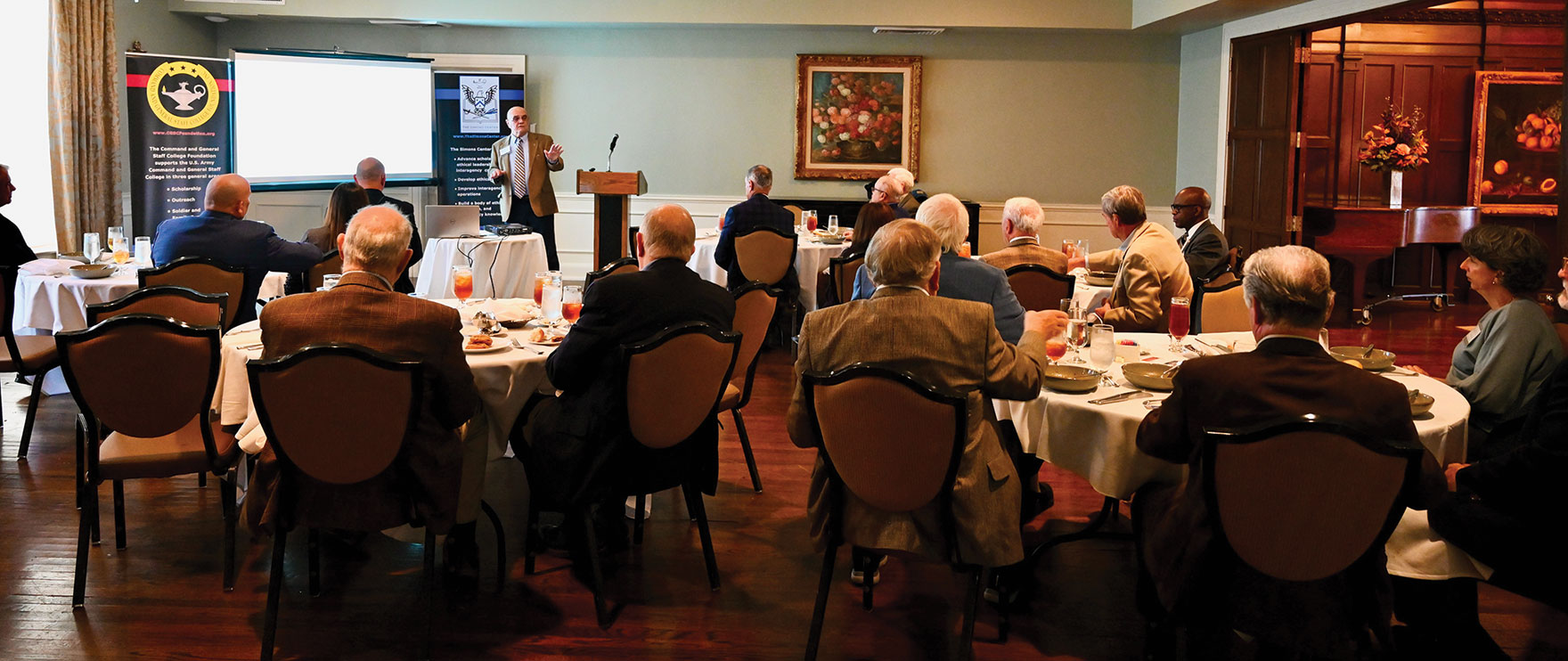 The CGSC Foundation’s Simons Center hosted an Arter-Rowland National Security Forum luncheon event on Nov. 16, 2023, at the Carriage Club in Kansas City.
The CGSC Foundation’s Simons Center hosted an Arter-Rowland National Security Forum luncheon event on Nov. 16, 2023, at the Carriage Club in Kansas City.
Simons Center Director Bob Ulin welcomed the ARNSF members, some of whom also introduced their guests and then introduced the guest speaker, Col. Gregory Fontenot, U.S. Army, Retired.
In this presentation of the forum, Fontenot, an author and former director of the School of Advanced Military Studies at Fort Leavenworth, provided an overview of the challenges the nation faced in mobilizing the U.S. Army for operations in World War II. At the end of the war, there were more than 12 million troops in uniform in all U.S. military services, of which nearly 6 million served in the ground forces of the U.S. Army. By 1947, the Army had shrunk to 684,000. By 1950, the Army was comprised of ten understrength regular divisions. Even today, the Army struggles to meet its end strength goals and according to the Congressional Research Service, the Army failed to reach its 2022 goal of 485,000 troops.
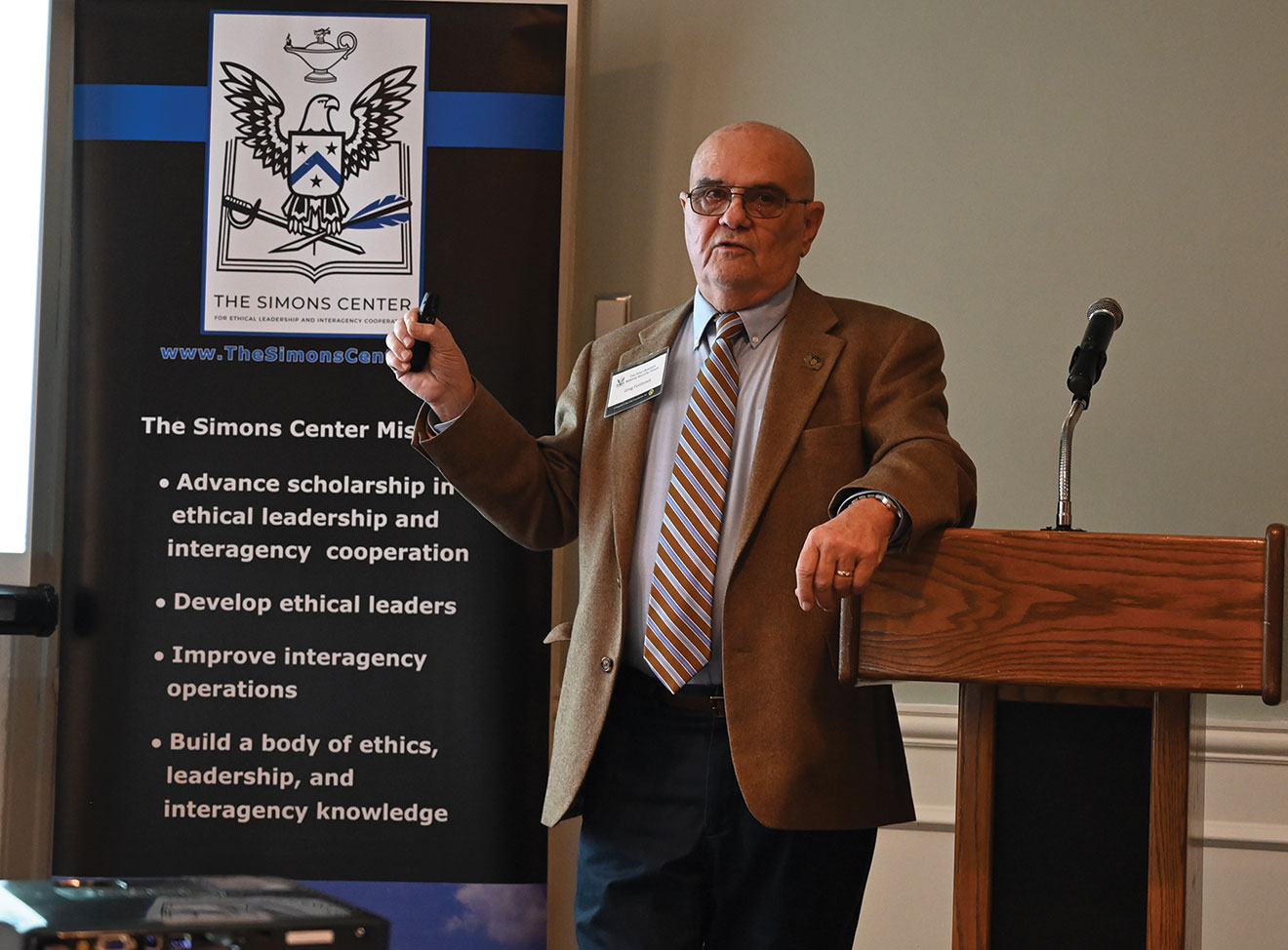
(Top photo and above) Col. (Ret.) Gregory Fontenot, author and former director of the School of Advanced Military Studies at Fort Leavenworth, discusses WWII troop recruiting, standards and training during the Arter-Rowland National Security Forum luncheon event on Nov. 16, 2023, at the Carriage Club in Kansas City.
Fontenot focused his discussion on the troops and how the nation handled troop requirements, standards and training for WWII, and posed some questions to the audience about how we might learn from those standards used in today’s recruiting.
Colonel (Ret.) Gregory Fontenot served in the U.S. Army as an armor officer for more than 28 years at duty locations in the United States, Europe, the Balkans and Southwest Asia. His key assignments included commanding a battalion during Operations Desert Shield and Storm and a brigade in Bosnia. As an educator he taught history at the U.S. Military Academy at West Point and was director of the School of Advanced Military Studies at Fort Leavenworth, Kansas. In his last assignment he commanded the Battle Command Training Program at Fort Leavenworth.
After his military retirement in 1999, Fontenot embarked on a second career as a Department of the Army Civilian in the military intelligence specialty. In this capacity he served as director of the U.S. Army Training and Doctrine Command’s wargaming directorate and later as director of the University of Foreign Military and Cultural Studies, the Army’s “red teaming” school. He served on campaign plan assessment teams in Iraq in 2010 and Afghanistan in 2011. He left the civil service in 2013 to pursue his interest in writing military history.
Fontenot has authored numerous articles and book reviews in Army magazine, Military Review and other publications, and is co-author of On Point: The United States Army in Operation Iraqi Freedom in 2003. In 2017 he published The 1st Infantry and the US Army Transformed: The Road to Victory in Desert Storm 1970-1991, which earned him the 2017 Army Historical Foundation Distinguished Writing Award for Unit History. In 2019 he published Loss and Redemption at St Vith: The 7th Armored Division in the Battle of the Bulge and his most recent work, No Sacrifice too Great: The 1st Infantry Division in World War II was published in June 2023.
Fontenot continues to support the U.S. Army as a consultant on threat emulation and leadership.
After the presentation and a question and answer period, Ulin presented Fontenot with a new CGSC/Simons Center coffee mug and Simons Center coin in appreciation for his time with the Forum. Ulin closed out the luncheon with a short brief about the schedule for future gatherings of the Forum.
For more photos see the CGSC Foundation Flickr album
The Arter-Rowland National Security Forum (ARNSF) is led by the CGSC Foundation’s Simons Center and is an exclusive professional information sharing and networking forum for those interested in keeping abreast of relevant information about national security issues.
Members of the Forum and their guests meet periodically at guest speaker events in downtown Kansas City. National and regional guest speakers representing all elements of national power (Diplomatic, Informational, Military and Economic) highlight the meetings. The Forum is nonpartisan, but elected government officials may present from time to time.
The Forum is named after Lt. Gen. (Ret.) Robert Arter, Founding Chairman of the CGSC Foundation, and Mr. Landon Rowland, the Foundation’s first major donor who was well-known in Kansas City for his keen interest in national security issues and his leadership in business and philanthropy.
ARNSF events are only open to ARNSF members and their guests. If you are not a member but are interested in joining, contact Bob Ulin at rulin@cgscf.org or visit the Forum page on the Simons Center website for more information.
The Arter-Rowland National Security Forum is cohosted by the CGSC Foundation’s Simons Center and the Kansas City Chapter of the Association of the United States Army (KCAUSA). 
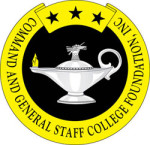
Simply enter your email address below and click the subscribe button...
We 100% respect your privacy





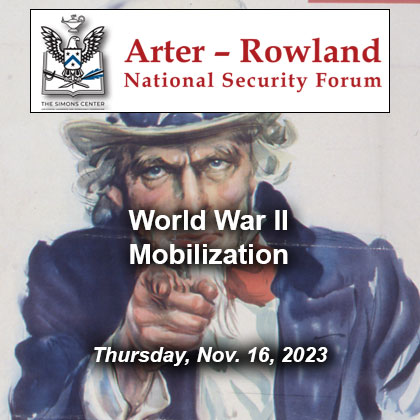
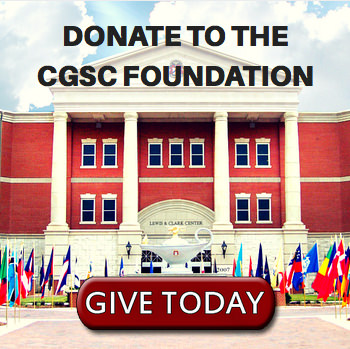
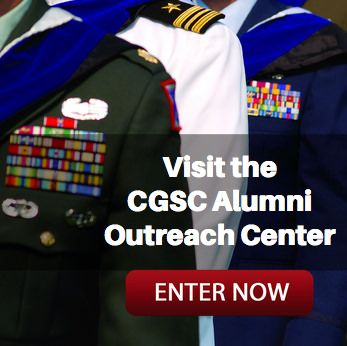





Leave a Reply